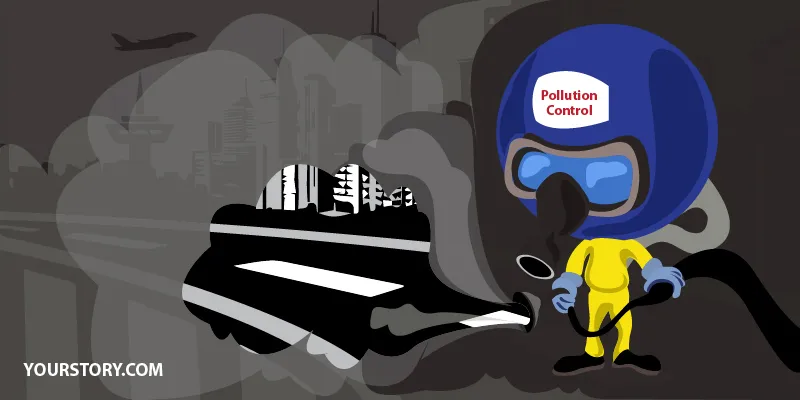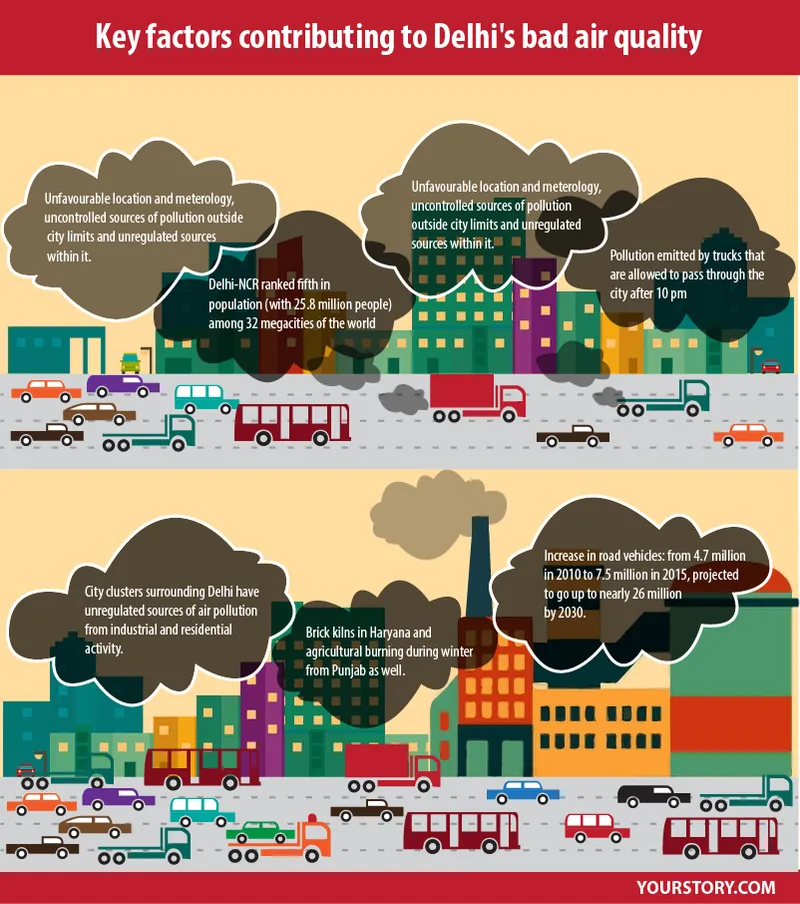Startups make a beeline to assist Delhi in its battle against pollution
The odd-even traffic rule imposed by the Delhi government to combat the toxic air pollution in the national capital, has kicked off on a good note on January 1. However, Chief Minister Arvind Kejriwal, initiating this rule was not an easy task. An MoU between the Delhi government and University of Chicago in December 2015 was a crucial step towards tackling the rising pollution levels in the city. The objective of this agreement was to conduct a two-month-long challenge—‘Urban Labs Innovation Challenge – Delhi’— inviting fresh ideas to improve air and water quality in the capital. The best idea would be rewarded with a seed fund of Rs 2 crore.
Startups are now busy trying to find ways to solve the problem of pollution.

We are in discussions with the Delhi Dialogue Committee members in charge of tackling the air pollution crisis in Delhi and we are sharing all the information and knowledge that we have learned so far with them so that they can use that in enacting policies that will ultimately change the quality of the outdoor air,” says Jay Kannaiyan, India head, Smart Air Filters.
The Delhi-based startup Smart Air Filters produces an indoor air purifier that is highly effective against PM 2.5, the primary air pollutant affecting urban Indian cities. It is produced as a result of combustion, such as exhaust from cars and trucks (diesel and petrol), coal production and other biomass burning.
The minute PM2.5 is highly harmful to human health, as it doesn't just affect lungs but can cross over into the blood stream and wreak havoc on other organs as well.
The startup claims that an H13 HEPA filter, which is used in the Smart Air Original DIY Air Purifier, captures 99.97 per cent of PM2.5 particles. For outdoor protection from pollution, the startup also retails N95 pollution masks that it claims are 95 per cent effective in trapping PM2.5 particles. The company has its presence in China and Mongolia also.
Shephali Shrimali, CEO, OnMask Life Sciences, says her startup is working on providing better protection against air pollutants.
There are a lot of pollutants which, if inhaled for longer periods, may lead to lung damage and other diseases related to respiratory organs and heart. We are focusing on the retail market of highly polluted cities in the country to provide its citizens with an effective solution against harmful pollutants,” she explains.
The Hyderabad-based startup produces anti-pollution masks which are washable and reusable. It claims its products are far superior to the ones available in the market, such as surgical masks, kerchiefs, bandanas and scarfs. In the coming months, the startup aims to come up with more technically-advanced masks which will be able to curb more harmful gaseous pollutants.
Solar Hippo, of Gurgaon-based Hippo Innovations, is a platform of solar products. Recently, the company has introduced air purifiers.“With the alarming pollution levels across India, we are hopeful that with our latest offering customers will be able to breathe fresh and healthy indoors,” says Rajiv Kumar, Founder & CEO, Hippo Solutions.
The contemporary air purifiers are equipped with latest technology like HEPA (High Efficiency Particulate Air) and advanced purification system to keep away germs. The air purifiers offer efficient Clean Air Delivery Rate (CADR) and air flow rate. It also shows ACH (Air Changes per Hour), which indicates the number of times the entire volume of air inside a room is replaced during the course of one hour.

Recently, Bengaluru based personal assistant app Helpchat launched a new feature that monitors the air in the surrounding environment and delivers a personalised air¬quality update via a mobile app.
The app will show the Air Quality Index (AQI) reading from 0 to 500+ (0 being the cleanest and 500 being the worst air quality), and suggest a precautionary measure depending on the air quality. The moment the app senses air quality getting below a certain point, it will send an alert to the user's smartphone. Additionally, it also suggests areas that one should avoid visiting in their city.
The AQI index shown by the app measures a number of volatile organic compounds (VOCs), carbon monoxide, and even cleaning agents or allergens that might affect the lungs or harm the health in the long run. Since pollution and its impact are directly linked with the weather conditions, the app also tracks the weather conditions and updates the users in real time.
Our pollution alerts will inform you about the air you are breathing and also suggest precautions to you. Going forward, we will enable people to buy pollution masks, suggest children-friendly outdoor zones, and even facilitate health checkups,” Ankur Singla, Founder and CEO, Helpchat
Measures to be taken to fight toxic pollution
Currently, Delhi has 20 monitoring stations being run by the Central Pollution Control Board (CPCB), Delhi Pollution Control Committee (DPCC) and the Indian Institute of Tropical Meteorology (IITM), Pune (under its SAFAR programme).
Most of these stations monitor pollutants of regulatory interest, such as particulate matter less than 10 μm (PM10) and 2.5 μm (PM2.5), sulphur dioxide (SO2), carbon monoxide (CO), ozone (O3) and nitrogen oxides (NOx).
Radha Goyal, Head (R&D), Indian Pollution Control Association, says,
All these stations are within Delhi city and coverage of NCR surrounding Delhi is minimal. This limits observational assessment of the influence of regional pollution advection on air quality in the city itself. Assessment of pollutant levels, and of precursors to secondary species, in the inflowing air from the NCR will be vital in determining the causes of poor air quality within the city perimeter.”
She suggests a city cluster approach to identify the sources of various pollutants, which (range from vehicular, industrial, domestic biomass burning, to diesel generators, construction activities, and resuspension of road dust. It is advisable to first get the complete source apportionment and emission inventory data of all city clusters of Delhi-NCR, as the pollution levels in Delhi is not only caused by sources situated within its boundaries.







